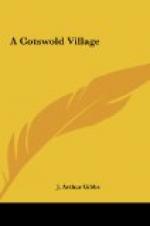It is sad to think that I alone of mortal men should be here to see this glorious panorama. It seems such a waste of nature’s bounteous store that night after night this wondrous spectacle should be solemnly displayed, with no better gallery than a stray shepherd, who, as he “homeward plods his weary way,” cares little for the grand drama that is being performed entirely for his benefit. Nature is indeed prodigal of her charms in out-of-the-way country places.
Sometimes whilst walking over these remote fields on summer evenings, I have stopped to ask myself this question: Is it possible that these exquisite wild flowers, these groves and dells of verdant tracery, these birds with their priceless music, and these wondrous, ineffable effects of light and shade which form part of the everyday pageant of English rural scenery are doomed “to waste their sweetness on the desert air”? Is it possible (to go further afield) that those lovely scenes in Wales—the fairy glens near Bettws-y-Coed, or the luxuriant valleys of Carmarthen, further south, where silvery Towey flows below the stately ruins of Dynevor Castle; those romantic reaches on the Wye, from Chepstow to the frowning hills of Brecon; those solitary, but unspeakably grand, mountains and passes of the Highlands, such as Glencoe, Ben Nevis, or those of the scarcely explored Hebrides; those smiling waters of the lovely Trossachs; those countless spots in the “Emerald Isle” that the tourist has never seen, whether in fertile Wicklow or among the whispering woods and weird waters of the west; those gorgeous forests of Ceylon; those interminable jungles of the beautiful East, with their unknown depths of tropical splendour;—is it possible that these scenes of wondrous beauty are inhabited and enjoyed by nothing more than is visible to our limited mortal gaze?
I believed, as a boy, and with a romance still unsubdued by time I would yet fain believe, that when the soul of man escapes from the poor tenement of clay in which it has been pent up for some threescore years and ten, it has not far to go. I would fain believe that heaven is not only above us, but, in some form or other entirely beyond our mortal ken, all around us, in every beautiful thing we see; that these hills and vales, these woods of delicately wrought fan-tracery groining, these mazes of golden light when the sun goes down, are peopled not alone by human flesh and blood. “There are also terrestrial bodies, and bodies celestial. But the glory of the celestial is one, and the glory of the terrestrial is another.”
Who can imagine the shape or form of the immortal soul? As I walked over those golden fields to-night it seemed as if there were spirits all around me—glorious, bright spirits of the dead—invisible, intangible, like rays of pure light, in the clear atmosphere of those Elysian fields. I cannot but believe that there arise from the secret parts of this beautiful earth, at dawn of day and at eventide, other voices besides the ineffable songs of birds, the rustling murmurs that whisper in the woods, and the plaintive babbling of the brooks—hymns of unknown depths of harmony, impossible to describe, because impossible to imagine—crying night and day: “Blessing, and honour, and glory, and power be unto Him that sitteth upon the throne and unto the Lamb for ever and ever.”




